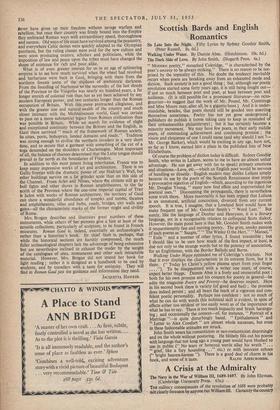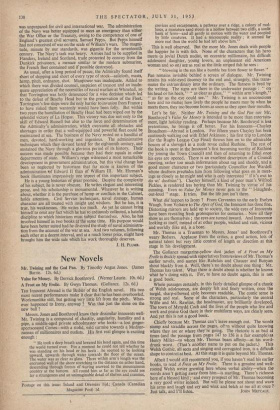A Crisis at the Admiralty
The Navy in the War of William III, 1689-1697. BY John Ehrman. (Cambridge University PreSs. 63s.) The Navy in the War of William III, 1689-1697. BY John Ehrman. (Cambridge University PreSs. 63s.)
Tin military consequences of the revolution of 1688 were probably not clearly foreseen by anyone but William III. Certainly the country was unprepared for civil and international war. The administration of the Navy was better equipped to meet an emergency than either the War Office or the Treasury, owing to the competence of one of England's greatest civil servants, Samuel Pepys. But Pepys himself had not conceived of war on the scale of William's wars. The magni-. tude, minute by our standards, was gigantic for the seventeenth century. The Navy's task was heavy. Armies had to be supplied in Flanders, Ireland and Scotland, trade protected by convoy from the Dunkirk privateers, a menace similar to the modern submarine, the French fleet contained and if possible destroyed.
As usual, after a long period of peace, the Admiralty found itself short of shipping and short of every type of stock—sailcloth, masts, hemp, pitch, ordnance, shot. Manpower was inadequate. Added to which there was divided counsel, suspicion of treason and an inade- quate appreciation of the necessities of naval warfare at Whitehall, so that Torrington was hotly denounced for a wise decision which led to the defeat of Beachy Head but to the preservation of the Fleet. Torrington 's few ships were the only barrier to invasion from France ; to have risked them wantonly would have been folly. But within two years the humiliation of Beachy Head had been wiped out by the splendid victory of La Hogue. This victory was due not only to the skill of Edward Russell but also to the force and determination of the Admiralty's administration, which overcame all obstacles and shortages in order that a well-equipped and powerful fleet could be maintained at sea. The business of the Navy rested on a handful of men, devoted, hard-working and ingenious. The administrative techniques which they devised lasted for the eighteenth century, and sustained the Navy through a glorious period of its history. Their success was made possible because they had their equals in other departments of state. William's reign witnessed a most remarkable development in government administration, but this vital change has been so neglected by historians that far more is known of the administration saf Edward II than of William III. Mr. Ehrman's book illuminates impressively one aspect of this important subject.
He is a young historian of great promise. Despite the complexity of his subject, he is never obscure. He writes elegant and interesting prose, and his scholarship is monumental. . Whatever he is writing about, whether it is the purchase of hemp or conflicts in the Cabinet, holds attention. Civil Service techniques, naval Strategy, human character are all treated with insight and wisdom. But he has, it is true, his weaknesses. Ile writes too much. As yet he cannot bring himself to omit any fact which he has so arduously collected, a hateful discipline to which historians must subject themselves. Also, he has involved himself in two books at the same time. His purpose would have been better suited had he divorced the study of naval administra- tion from the account of the war at sea. And two volumes, following each other at a decent interval, and at a much lower price, might have brought him the wide sale which his work thoroughly deserves.
J. H. PLUMB.



































 Previous page
Previous page